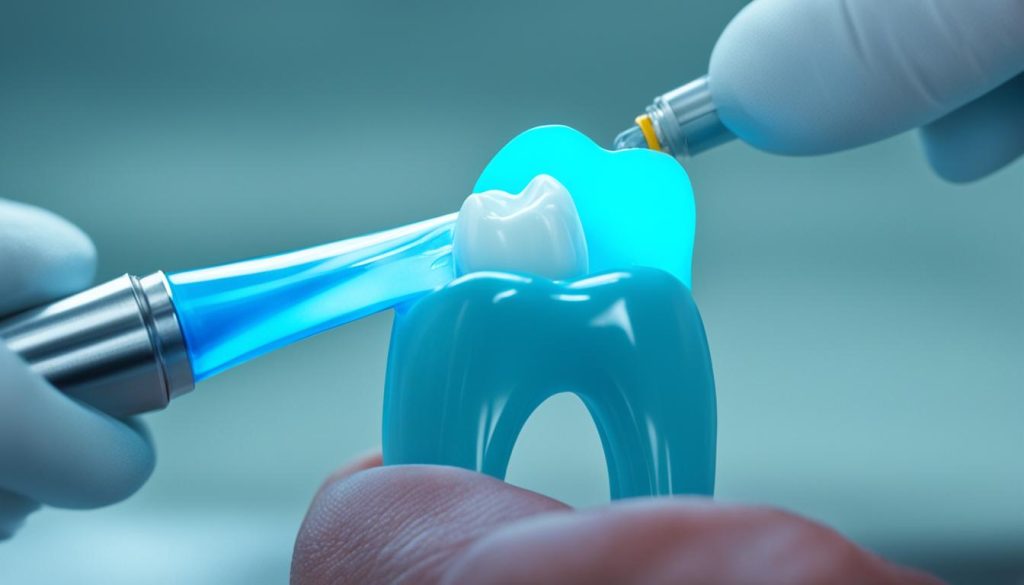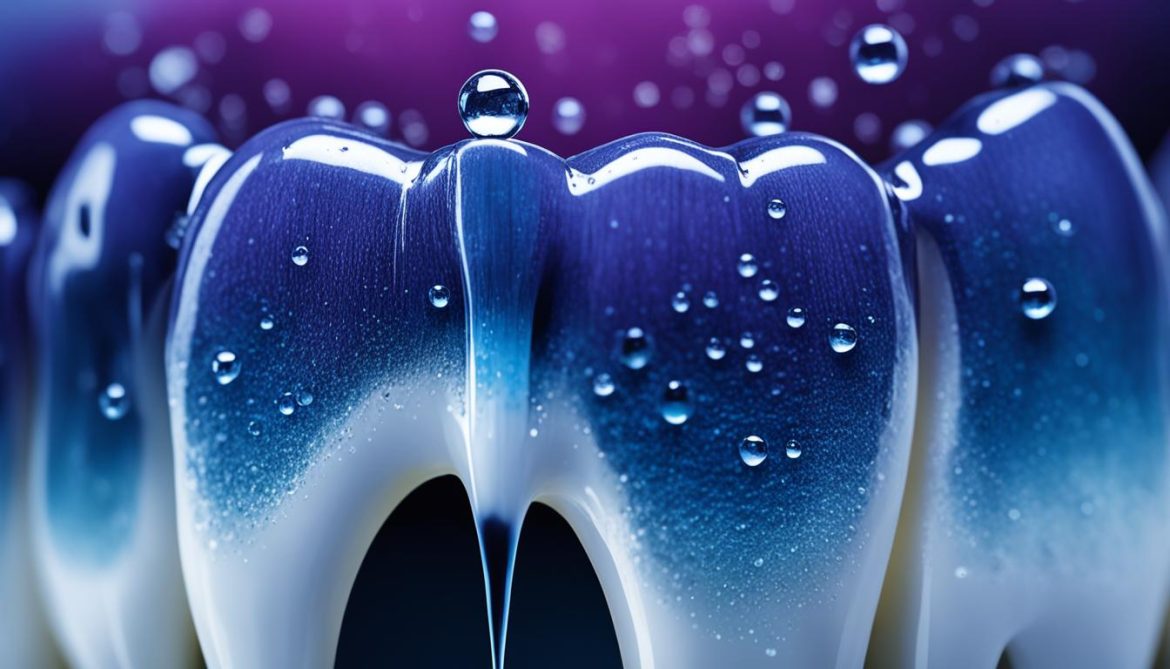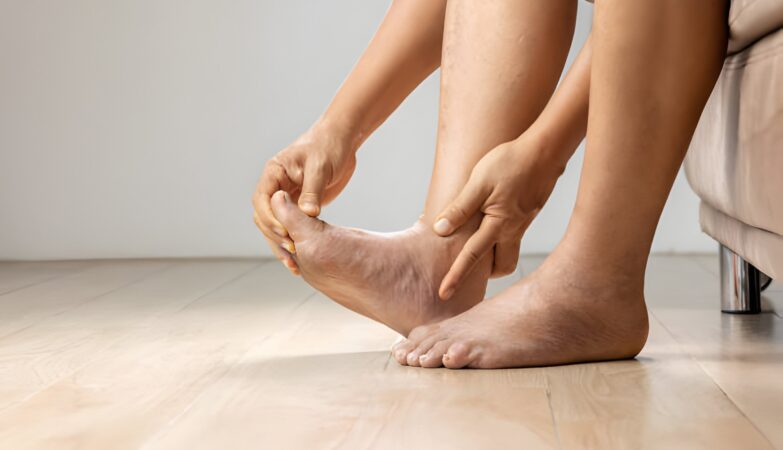Have you ever wondered why your teeth hurt when you drink cold water? You’re not alone. Many people experience tooth sensitivity, also known as dental pain, when consuming cold beverages or foods. This sensitivity can be quite uncomfortable and may indicate underlying oral health issues that need to be addressed.
Tooth sensitivity is a common condition, with over 40 million American adults suffering from it. Understanding the causes of tooth sensitivity and seeking appropriate dental care can help alleviate the pain and prevent further damage to your teeth.
Key Takeaways:
- Tooth sensitivity is a common condition that affects many people.
- Cold sensitivity in teeth can be a sign of underlying oral health issues.
- Over 40 million American adults suffer from tooth sensitivity.
- Proper dental care and treatment can help alleviate tooth sensitivity.
- Regular dental check-ups are important for detecting and addressing tooth sensitivity.
Common Causes of Tooth Sensitivity
Tooth sensitivity can be a result of various factors, ranging from everyday habits to oral health conditions. Understanding these common causes can help you identify the root cause of your tooth sensitivity.
- Tooth Grinding (Bruxism): Excessive teeth grinding can wear down the tooth enamel, exposing the sensitive roots and leading to tooth sensitivity.
- Gum Disease: Periodontal disease can cause gum recession, exposing the roots of the teeth and resulting in sensitivity to hot and cold temperatures.
- Cracked Tooth: A cracked tooth can expose the sensitive nerves within the tooth, leading to heightened sensitivity.
- Tooth Decay: When tooth decay progresses beyond the enamel and reaches the dentin layer of the tooth, it can result in sensitivity to cold sensations.
- Bacterial Infection: Infections within the tooth or gums can cause inflammation and damage to the tooth structure, leading to sensitivity.
- Enamel Loss: Wear and tear, acid erosion, or aggressive brushing can cause enamel loss, exposing the dentin and causing tooth sensitivity.
If you are experiencing tooth sensitivity, it is essential to consult with a dental professional to determine the underlying cause and receive appropriate treatment.
Quote:
“Identifying the common causes of tooth sensitivity is the first step towards finding relief and preventing further damage to your oral health.”
Factors Contributing to Tooth Sensitivity
| Cause | Description |
|---|---|
| Tooth Grinding (Bruxism) | Excessive grinding of teeth can wear down enamel and expose sensitive roots. |
| Gum Disease | Periodontal disease can cause gum recession, exposing tooth roots. |
| Cracked Tooth | A crack in a tooth can expose sensitive nerves. |
| Tooth Decay | Decay that reaches the dentin layer can lead to sensitivity. |
| Bacterial Infection | Infections within the tooth or gums can cause inflammation and sensitivity. |
| Enamel Loss | Wear, erosion, or aggressive brushing can result in enamel loss and sensitivity. |
Understanding Tooth Sensitivity to Cold
When you experience tooth sensitivity to cold, it can be uncomfortable and even painful. This sensitivity is often a result of exposed nerves within the dental pulp. The nerve exposure can be caused by various factors, including root exposure, enamel loss, a cavity, or a cracked tooth.
The nerves in the pulp of your tooth are typically protected by layers of enamel and dentin. However, when these protective layers are compromised, such as through root exposure or enamel loss, the nerves become more susceptible to external stimuli, like cold air or liquid. When cold comes into contact with the exposed dentinal tubules that connect to the nerves, it can trigger a pain response. This is what you perceive as tooth sensitivity to cold.
It’s important to note that tooth sensitivity to cold can be an indication of underlying dental issues that require attention. If you regularly experience sensitivity to cold, it’s recommended to consult with a dentist to determine the underlying cause and necessary treatment.
There are various factors that can contribute to tooth sensitivity to cold, including:
- Root exposure: When the roots of your teeth become exposed, either due to gum recession or other causes, they can be more sensitive to temperature changes.
- Enamel loss: The protective enamel layer on the surface of your teeth can wear away over time, exposing the more sensitive dentin layer.
- Cavity: Tooth decay can lead to the formation of cavities, which can expose the nerves within the tooth.
- Cracked tooth: A cracked tooth can expose the underlying nerves, making them more sensitive to cold.
By understanding the causes of tooth sensitivity to cold, you can better address the issue and seek appropriate dental care. Your dentist can help determine the underlying cause and recommend suitable treatment options to alleviate your tooth sensitivity.
Treating and Preventing Tooth Sensitivity
Dealing with tooth sensitivity can be an uncomfortable experience. Luckily, there are several effective ways to treat and prevent tooth sensitivity to help you find relief and protect your oral health.
Using Sensitive Toothpaste and Soft-Bristled Toothbrush
One of the first steps in treating tooth sensitivity is to switch to a toothpaste specifically designed for sensitive teeth. These toothpastes contain ingredients that help reduce sensitivity and provide relief. Additionally, using a soft-bristled toothbrush can help prevent further irritation and enamel wear. The gentle bristles minimize the risk of causing discomfort while ensuring proper oral hygiene.
Avoiding Acidic Foods and Beverages
Acidic foods and beverages can contribute to enamel erosion, leading to increased tooth sensitivity. To protect your teeth, it’s important to steer clear of acidic foods such as citrus fruits, tomatoes, and sodas. Instead, opt for tooth-friendly alternatives and incorporate a balanced diet that promotes oral health.
Wearing a Mouthguard at Night
For individuals who grind their teeth at night, wearing a mouthguard can be extremely beneficial. A mouthguard acts as a protective barrier that prevents excessive wear and tear on the teeth. By reducing the impact of grinding, a mouthguard can help alleviate tooth sensitivity caused by bruxism.
Schedule Regular Dental Examinations
Regular dental examinations play a vital role in preventing and managing tooth sensitivity. These routine check-ups allow your dentist to monitor the condition of your teeth and identify any underlying issues that may be causing sensitivity. Additionally, professional cleanings can help remove plaque buildup and prevent tooth decay, which can contribute to sensitivity.

To summarize, treating and preventing tooth sensitivity involves using sensitive toothpaste and a soft-bristled toothbrush, avoiding acidic foods and beverages, wearing a mouthguard at night, and scheduling regular dental examinations. By following these practices, you can reduce sensitivity, protect your teeth, and maintain a healthy smile.
Seeking Dental Care for Tooth Sensitivity
If you are experiencing persistent tooth sensitivity for more than a few days, it is important to seek dental care to determine the underlying cause and extent of the issue. A diagnostic evaluation by a dentist or endodontist will help identify the specific factors contributing to your tooth sensitivity and guide appropriate treatment options.
The diagnostic evaluation will involve a thorough examination of your teeth, gums, and oral health. The dentist or endodontist will assess the sensitivity level, inspect for signs of decay or infection, and evaluate the overall condition of your dental health. This process may include:
- x-rays to identify any hidden issues, such as cavities or root canal problems;
- probing and testing the affected tooth to determine the level of sensitivity;
- a visual inspection of your gums for signs of gum disease or recession;
- questioning you about your symptoms and dental history.
Based on the diagnostic evaluation, the dentist or endodontist will recommend the most suitable treatment options for your condition. These may include:
- Root canal therapy: In cases where the tooth’s nerves are affected and causing severe sensitivity, a root canal procedure may be necessary to remove the infected or damaged pulp and alleviate the pain.
- Filling cavities: If tooth decay is the cause of your sensitivity, the dentist will fill the cavities to protect the tooth from further damage and reduce sensitivity.
- Treating gum disease: If gum disease is contributing to your tooth sensitivity, the dentist will recommend appropriate treatments to address the underlying infection and prevent further gum recession.
- Abscess treatment: In cases where an abscess is present, which is often accompanied by severe pain and swelling, a root canal or tooth extraction may be necessary to treat the infection and alleviate the discomfort.
It is crucial to follow your dentist’s recommendations and undergo the necessary treatment to address tooth sensitivity effectively. Ignoring the issue can lead to further complications and potential tooth loss. Remember, early intervention is key to maintaining optimal oral health and preventing future dental problems.
Tips for Relieving Tooth Sensitivity
If you suffer from tooth sensitivity, there are several tips that can help alleviate the discomfort and improve your oral health. By following these recommendations, you can find relief and prevent further damage to your teeth.
1. Use Toothpaste for Sensitive Teeth
One of the most effective ways to relieve tooth sensitivity is by using toothpaste specifically designed for sensitive teeth. These toothpastes contain ingredients that help to desensitize the nerves in your teeth, providing relief from sensitivity.
2. Brush Gently
Gentle brushing is key when you have sensitive teeth. Use a soft-bristled toothbrush and avoid aggressive brushing techniques that can further wear down enamel and expose sensitive areas. Remember to brush all surfaces of your teeth and along the gumline to maintain good oral hygiene.
3. Avoid Acidic Foods
Acidic foods and beverages can erode tooth enamel, leading to increased tooth sensitivity. Limit your consumption of acidic foods such as citrus fruits, tomatoes, and soda. If you do indulge in acidic foods or drinks, rinse your mouth with water afterward to neutralize the acid.
4. Consider Remineralization Treatments
In some cases, your dentist may recommend remineralization treatments to strengthen the enamel and reduce tooth sensitivity. These treatments often involve the application of fluoride or other remineralizing agents to the teeth, helping to repair and strengthen the enamel.
5. Follow a Good Oral Hygiene Routine
Maintaining a good oral hygiene routine is essential for relieving tooth sensitivity. Brush your teeth twice a day, floss daily, and use mouthwash to remove plaque and bacteria. Regular dental check-ups and cleanings are also important for detecting and addressing any underlying issues that may be causing sensitivity.
By implementing these tips into your daily routine, you can take steps towards relieving tooth sensitivity and improving your oral health.
| Tips for Relieving Tooth Sensitivity | |
|---|---|
| Use toothpaste for sensitive teeth | Brush gently |
| Avoid acidic foods | Consider remineralization treatments |
| Follow a good oral hygiene routine |
Understanding Cold-Sensitive Teeth
Cold-sensitive teeth can be a source of discomfort and pain, making it difficult to enjoy your favorite cold treats. This condition occurs when the nerves within the tooth become exposed due to receding gums or worn tooth enamel. Several factors can contribute to the development of cold-sensitive teeth, including:
- Tooth decay: The presence of cavities can lead to the erosion of tooth enamel, exposing the nerves within the tooth.
- Gum disease: Gum disease, such as gingivitis or periodontitis, can cause the gums to recede, exposing the delicate roots and nerves of the teeth.
- Overzealous product use: Using aggressive tooth whitening treatments or abrasive toothbrushes can wear away tooth enamel, leaving the nerves vulnerable to cold sensations.
- Grinding teeth: Bruxism, or grinding and clenching of the teeth, can lead to the wearing down of enamel and the exposure of sensitive nerve roots.
- Cracks in teeth: Cracked teeth can create pathways for cold air or liquids to reach the nerves, causing sensitivity.
- Receding gums: As gums recede, the roots of the teeth become exposed, making it easier for hot and cold sensations to travel to the nerves.
It is important to address cold-sensitive teeth as the condition can worsen over time if left untreated. Seeking dental care from a professional can help determine the cause of your cold sensitivity and provide appropriate treatment options. By understanding the underlying factors contributing to cold-sensitive teeth, you can take steps to alleviate the discomfort and protect the long-term health of your teeth.
Conclusion
Tooth sensitivity is a common dental issue that can cause discomfort when consuming cold foods or beverages. However, with the proper dental care and preventive measures, you can find relief and maintain a healthy smile. It is crucial to seek professional dental care if you experience tooth sensitivity to address any underlying issues and prevent further damage.
Understanding the causes of tooth sensitivity is key to effective prevention and treatment. By following proper oral hygiene practices, such as using a toothpaste formulated for sensitive teeth and brushing gently with a soft-bristled toothbrush, you can alleviate pain and reduce sensitivity. Avoiding acidic foods and beverages and wearing a mouthguard at night can also help prevent enamel erosion and tooth grinding, which can contribute to tooth sensitivity.
Regular dental check-ups are essential for detecting any underlying dental issues that may be causing tooth sensitivity. Your dentist can provide appropriate treatment, such as filling cavities, addressing gum disease, or recommending a root canal if necessary. By taking proactive steps and seeking professional dental care, you can effectively manage tooth sensitivity and maintain optimal oral health.
Remember, prevention is key. By maintaining a good oral hygiene routine, visiting your dentist regularly, and following their recommendations, you can minimize the risk of developing tooth sensitivity in the future. So prioritize your dental health, and enjoy a pain-free, confident smile.
FAQ
Why do my teeth hurt when I drink cold water?
Tooth sensitivity to cold water can be caused by factors such as tooth grinding, gum disease, cracked teeth, tooth decay, bacterial infections, and enamel loss. When the teeth are sensitive to cold, it indicates that the sensitive nerves within the dental pulp are somewhat exposed.
What are the common causes of tooth sensitivity?
Common causes of tooth sensitivity include tooth grinding (bruxism), gum disease, cracked teeth, tooth decay, bacterial infections, and enamel loss. These factors can lead to exposure of the sensitive nerves within the teeth, resulting in sensitivity to cold beverages or foods.
How does tooth sensitivity to cold occur?
Tooth sensitivity to cold occurs when the nerves within the tooth become exposed due to root exposure, enamel loss, cavities, or cracked teeth. The nerves in the dental pulp become stimulated when cold air or liquid comes into contact with the exposed dentinal tubules, leading to pain and sensitivity.
How can tooth sensitivity be treated and prevented?
Tooth sensitivity can be treated and prevented by using a toothpaste specifically designed for sensitive teeth, using a soft-bristled toothbrush, avoiding acidic foods and beverages, wearing a mouthguard at night to prevent tooth grinding, and maintaining regular dental examinations and cleanings.
When should I seek dental care for tooth sensitivity?
If tooth sensitivity persists for more than a few days, it is important to seek dental care. A dentist or endodontist can perform a diagnostic evaluation to determine the cause and extent of the sensitivity. Treatment options may include a root canal, filling cavities, or addressing gum disease.
What are some tips for relieving tooth sensitivity?
To relieve tooth sensitivity, you can use a toothpaste specifically designed for sensitive teeth, brush gently, avoid acidic foods, and consider remineralization treatments to strengthen enamel. It is important to follow a good oral hygiene routine and visit the dentist regularly for optimal oral health.
What causes cold-sensitive teeth?
Cold-sensitive teeth can be caused by tooth decay, gum disease, overusing tooth whitening treatments, grinding teeth, and more. Exposed nerve roots and cracks in teeth can also contribute to cold sensitivity. Receding gums make it easier for hot and cold sensations to travel to the nerves in the teeth.
What is the importance of dental care for tooth sensitivity?
Dental care is important for addressing and preventing further damage caused by tooth sensitivity. Regular check-ups can detect any underlying issues and provide appropriate treatment. By taking care of your teeth and seeking professional care, you can maintain a healthy and pain-free smile.







